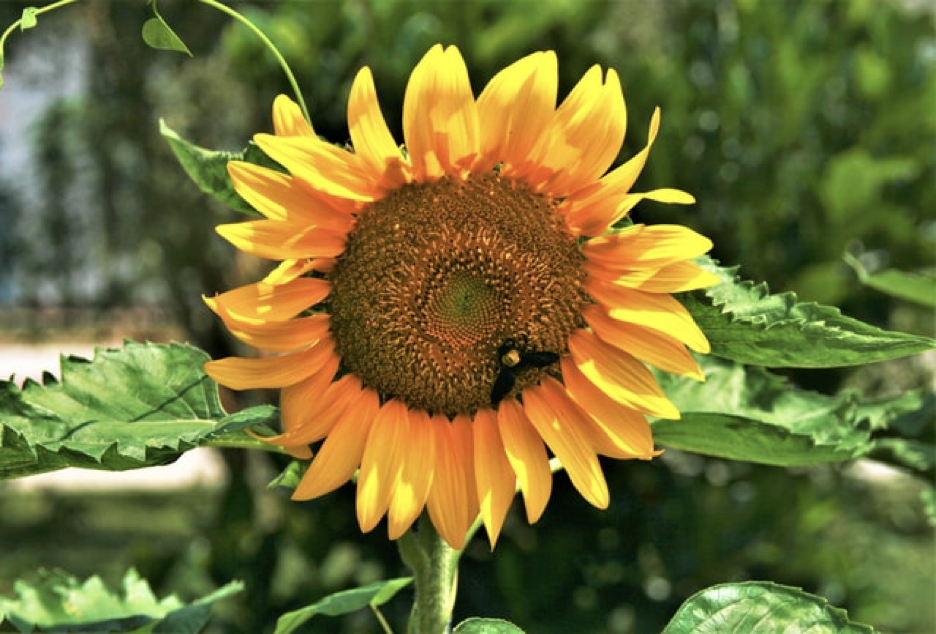
Bees are an essential part of the ecosystem, especially for gardeners. Anyone who grows outdoor plants knows that bees help their garden move through various growth stages. Some people believe small urban gardens can distract bees from more extensive food systems, which may discourage you from planting anything in a small yard or terrace.
Read on to learn why small gardens are just as important for pollinators in cities and how you can grow more pollinator-friendly plants.
Are Big Gardens Better for Bees?
It makes sense to assume that bees do better around sprawling gardens. Small groups of plants would generate less nectar, so wouldn’t the bees remain hungrier if they spent all their time around a limited food source?
A recent study found that pollinators did equally well with small gardens compared to the nectar supply of spaces with more plants. It all depends on how many flowers are in each garden. Yards or terraces filled with vegetable plants or greenery won’t help bees as much as a windowsill full of flowers.
Which Plants Are Best for Bees?
If you intend to create a haven for bees in your urban garden, it’s best to strategize your plant selections. Some are better for bees than others because they produce more nectar or have floral structures wide enough for bees to access the nectar with their short tongues.
Consider planting flowers such as:
- Black-Eyed Susans
- California Poppies
- Chive Flowers
- Marigolds
- Peonies
Remember that you’ll need to research flower varieties beyond how well they serve as food sources for bees. Some plants require specific soil temperatures and light exposure to form roots and begin sprouting.
If that’s the case, they’ll likely come in small cartons or pots at a local plant nursery. Experts advise that gardeners choose containers three times the size of their original pots and grow them indoors until robust root systems form.
Are Bees Going Extinct?
Most people have heard others talking about saving the bees over the last decade. While there has been a decline in the general bee population, honey bees specifically are not in danger.
Although many pollinator species are at risk of becoming extinct, honey bees did not make the 2016 update to endangered lists because their population is thriving. You’ll help them stay off that list by providing a haven in your urban neighborhood.
What Makes Gardens More Bee-Friendly?
Selecting a pollinator-friendly plant is just one thing you can do to make your garden more bee-friendly. You can also avoid spraying insecticides or pesticides on and around your plants. Bees can walk through these chemicals and bring them back to their hive, indirectly killing their colony through long-term contact with the ingredients.
You can also plant a variety of flowers that bees tend to love. If they have multiple food sources, they will access food throughout the year. Each plant has different growth and blooming schedules, so when one begins to go dormant, another may start to thrive. Bees won’t have to wait for a few specific months out of the year to visit your garden and fill up on nectar.
Bees also do better in gardens that have water. They may not find fresh water in big or small cities because there’s widespread urbanization. Cover the inside of a tray with stones and fill it with enough water to nearly reach the top of each stone. Bees can settle on their surfaces and get a drink of water while stopping by your flowers.
Having bee essentials like food sources and water nearby and a bee-friendly garden, in general, presents an ideal environment for bees to thrive in your backyard.
If you’re able, you can raise bees yourself by getting a beekeeping starter kit. There are plenty of benefits to keeping bees—not only with your garden thrive, you also get to improve the bee population and reap the benefits of their hard work, like honey and beeswax. Taking care of bees requires constant learning, especially on relevant beehive management practices—do your research online and consider joining a local beekeeping club.
Grow Your Garden in the City
Every gardener needs to remember that small gardens are just as important for pollinators in cities as big gardens. No matter how much room you can dedicate to your plants, providing a variety of pollinator-friendly flowers and even offering a tray of water will boost the local bee population and help protect the ecosystem.
Bio:
Jane is an environmental writer and the founder and editor-in-chief of Environment.co where she covers sustainability and eco-friendly living.
